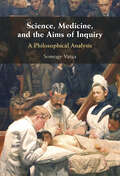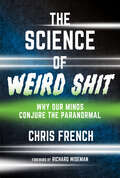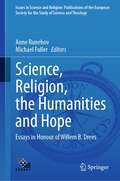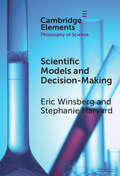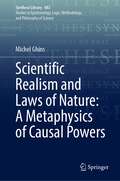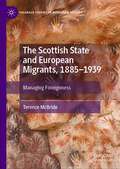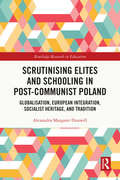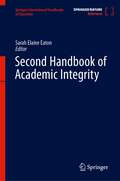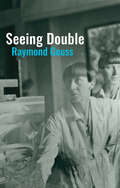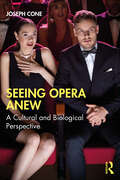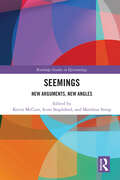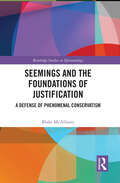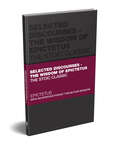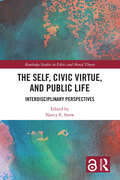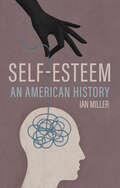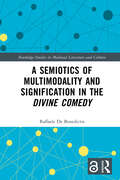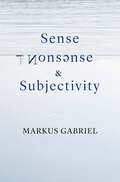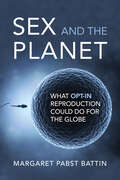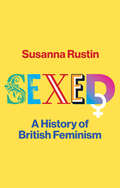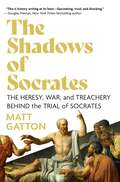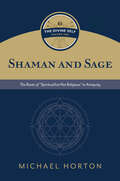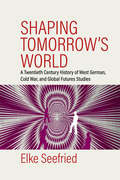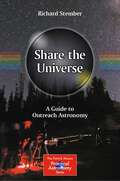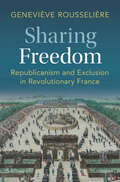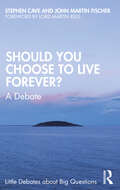- Table View
- List View
Science, Medicine, and the Aims of Inquiry: A Philosophical Analysis
by null Somogy VargaAfter its unparalleled rise and expansion over the past century, medicine is increasingly criticized both as a science and clinical practice for lacking scientific rigor, for contributing to overmedicalization, and for failing to offer patient-centered care. This criticism highlights serious challenges which indicate that the scope and societal role of medicine are likely to be altered in the 21st century. Somogy Varga's ground-breaking book offers a new perspective on the challenges, showing that they converge on fundamental philosophical questions about the nature and aim of medicine. Addressing these questions, Varga presents a philosophical examination of the norms and values constitutive of medicine and offers new perspectives on how to address the challenges that the criticism raises. His book will offer valuable input for rethinking the agenda of medical research, health care delivery, and the education of health care personnel.
The Science of Weird Shit: Why Our Minds Conjure the Paranormal
by Chris FrenchAn accessible and gratifying introduction to the world of paranormal beliefs and bizarre experiences.Ghostly encounters, alien abduction, reincarnation, talking to the dead, UFO sightings, inexplicable coincidences, out-of-body and near-death experiences. Are these legitimate phenomena? If not, then how should we go about understanding them? In this fascinating book, Chris French investigates paranormal claims to discover what lurks behind this &“weird shit.&” French provides authoritative evidence-based explanations for a wide range of superficially mysterious phenomena, and then goes further to draw out lessons with wider applications to many other aspects of modern society where critical thinking is urgently needed.Using academic, comprehensive, logical, and, at times, mathematical approaches, The Science of Weird Shit convincingly debunks ESP, communicating with the dead, and alien abduction claims, among other phenomena. All the while, however, French maintains that our belief in such phenomena is neither ridiculous nor trivial; if anything, such claims can tell us a great deal about the human mind if we pay them the attention they are due. Filled with light-bulb moments and a healthy dose of levity, The Science of Weird Shit is a clever, memorable, and gratifying read you won&’t soon forget.
Science, Religion, the Humanities and Hope: Essays in Honour of Willem B. Drees (Issues in Science and Religion: Publications of the European Society for the Study of Science and Theology #8)
by Anne Runehov Michael FullerThis book collects a multidisciplinary range of contributions focusing on the prolific and seminal work of Willem Drees in the fields of philosophy of religion, philosophy of the humanities, and science and theology/religion. Trained in both theoretical physics and theology/philosophy of religion, Drees holds doctoral degrees in both theology and in philosophy and, amongst other distinguished positions, held professorships at the University of Leiden and at the University of Tilburg. Drees was also Editor-in-Chief of Zygon, Journal of Religion & Science, between 2008 and 2018, and served as President of the European Society for the Study of Science and Theology (ESSSAT) between 2002 and 2008. In 2018, he was elected as member of the Royal Holland Society of Sciences and Humanities (KHMW). This contributed volume builds on Drees’ expansive and provocative scholarly contributions, notably around the concept and meaning of naturalism and the humanities to the fields of science and religion, as exemplified by his works Religion, Science and Naturalism (1996) and What Are the Humanities For? (2021). In a time where more and more young people across the globe are entering higher education such cross-disciplinary explorations and (re-)evaluations are vital to the field. Accordingly, by approaching his work from a variety of disciplines this collection illuminates the broad reach of Drees’ work and provides scholars from various fields with many new and rich opportunities avenues for research.
Scientific Models and Decision Making (Elements in the Philosophy of Science)
by null Eric Winsberg null Stephanie HarvardThis Element introduces the philosophical literature on models, with an emphasis on normative considerations relevant to models for decision-making. Chapter 1 gives an overview of core questions in the philosophy of modeling. Chapter 2 examines the concept of model adequacy for purpose, using three examples of models from the atmospheric sciences to describe how this sort of adequacy is determined in practice. Chapter 3 explores the significance of using models that are not adequate for purpose, including the purpose of informing public decisions. Chapter 4 provides a basic framework for values in modelling, using a case study to highlight the ethical challenges in building models for decision making. It concludes by establishing the need for strategies to manage value judgments in modelling, including the potential for public participation in the process.
Scientific Realism and Laws of Nature: A Metaphysics of Causal Powers (Synthese Library #483)
by Michel GhinsThis book addresses central issues in the philosophy and metaphysics of science, namely the nature of scientific theories, their partial truth, and the necessity of scientific laws within a moderate realist and empiricist perspective. Accordingly, good arguments in favour of the existence of unobservable entities postulated by our best theories, such as electrons, must be inductively grounded on perceptual experience and not their explanatory power as most defenders of scientific realism claim. Similarly, belief in the reality of dispositions such as causal powers which ground the natural necessity of scientific laws must be based on experience. Hence, this book offers a synthetic presentation of an original metaphysics of science, namely a metaphysics of properties, both categorical and dispositional, while at the same time opposing strong versions of necessitarism according to which laws are true in all possible worlds.The main theses and arguments are clearly presentedin a non-technical way. Thus, on top of being of interest to the specialists of the topics discussed, it is also useful as a textbook in courses for third year and more advanced university students.
The Scottish State and European Migrants, 1885–1939: Managing Foreignness (Palgrave Studies in Migration History)
by Terence McBrideThis book examines the efforts of the government in Scotland to manage the increase of migrants travelling to Britain at the end of the nineteenth century. Focussing on the period between 1885 and 1939, the book explores how the Scottish machinery of government handled the administration of ‘foreigners.’ The author uses a comparative, thematic approach to analyse migrant experiences, identities, and relationships with state institutions. Drawing from state records held by the National Records of Scotland in Edinburgh, the book argues that Scottish officials in semi-autonomous boards began to recognise, describe and enumerate the presence of the ‘foreigner’ in the early twentieth century, framing their handling of foreignness in accordance with the Aliens Act of 1905. The author goes on to explain that institutions operating in Scotland developed a distinctly Scottish approach to alien matters, which continued up until the Second Word War. Therefore, an increasing number of importantdecisions affecting migrants were taken by a distinctly Scottish machinery of government, impacting on how Scottish officials understood foreignness, and how those identified as foreigners understood their identity in relation to Scottishness. Contributing significantly to current heated debates on migration and identity amongst researchers and the general public in Europe and beyond, this book provides essential insights into the ways in which a ‘sub-state’ began to develop practices, processes and attitudes towards migration which were not always in line with that of the central government.
Scrutinising Elites and Schooling in Post-Communist Poland: Globalisation, European Integration, Socialist Heritage, and Tradition (Routledge Research in Education)
by Alexandra Margaret DunwillThis book offers new insights and methodological tools to improve our understandings of how prestigious schools in Poland navigate the major political, social and cultural crosscurrents. The range of choice for elite schooling in Poland has expanded during its post-communist transformation. However, while elite education in countries such as the US, Australia, UK, France, and Switzerland has been extensively studied, post-communist countries have been largely neglected. This book explores the emergence of such schools within a context influenced by a range of different and often conflicting social forces. In doing so, the study elucidates how the socio-historical processes since 1989 diversified Poland’s egalitarian education system and facilitated the emergence of schools for elites. The book demonstrates that social and political changes in Poland triggered the emergence of new elites with different political and social outlooks, leading to a variety of types of elite schools that reflect and reproduce the elites’ positions and idiosyncrasies. A bespoke theoretical arrangement scrutinises extant and generated data from elite schools’ websites, online readers’ forums, and interviews with elite school principals. The book contributes new insights into elite schools in Central and Eastern European (CEE) countries, enriching the existing body of knowledge on elites and elite schools around the world. It will be of interest to researchers and postgraduate students investigating elite education, sociology of education, education policy, and education and international development.
Second Handbook of Academic Integrity (Springer International Handbooks of Education)
by Sarah Elaine EatonThe book brings together diverse views from around the world and provides a comprehensive overview of academic integrity and how to create the ethical academy. At the same time, the Handbook does not shy away from some of the vigorous debates in the field such as the causes of academic integrity breaches. There has been an explosion of interest in academic integrity in the last 20-30 years. New technologies that have made it easier than ever for students to ‘cut and paste’, coupled with global media scandals of high profile researchers behaving badly, have resulted in the perception that plagiarism is ‘on the rise’. This, in combination with the massification and commercialisation of higher education, has resulted in a burgeoning interest in the importance of academic integrity, how to safeguard it and how to address breaches appropriately. What may have seemed like a relatively easy topic to address – students copying sources without attribution – has in fact, turned out to be a complex, interdisciplinary field of research requiring contributions from linguists, psychologists, social scientists, anthropologists, teaching and learning specialists, mathematicians, accountants, medical doctors, lawyers and philosophers, to name just a few.Because of this broad interest and input, this handbook serves as the single authoritative reference work which brings together the vast, growing, interdisciplinary and at times contradictory body of literature. For both established researchers/practitioners and those new to the field, this Handbook provides a one-stop-shop as well as a launching pad for new explorations and discussions.
Seeing Double
by Raymond GeussThe world is never going to make complete sense to us, yet we find that conclusion almost impossible to accept. Can we live, and feel at home, in a world composed at best of incompatible fragments of meaning?This is the theme that runs through this collection of essays by Raymond Geuss. Drawing on a characteristically wide range of insights from moral and political philosophy, history, and aesthetics, he addresses topics such as knowledge (of self, the world, and others), language, the visual and the auditory, authority, hope, and the success and failure of life projects. He argues that, to get by in our bewildering world, we must embrace the virtue of ‘double vision’: that is, immersing ourselves in and learning the ways of the culture surrounding us, even as we feel alienated from it. Together the essays explore some of the consequences of abandoning the idea of a unitary view of the world, while at the same time trying to avoid quietism.Seeing Double is a compelling collection of work by one of the world’s most versatile and creative philosophers.
Seeing Opera Anew: A Cultural and Biological Perspective
by Joseph ConeWhat people ultimately want from opera, audience research suggests, is to be absorbed in a story that engages their feelings, even moves them deeply, and that may lead them to insights about life and, perhaps, themselves. How and why can this combination of music and drama do that? What causes people to be moved by opera? How is it that people may become more informed about living and their own lives? Seeing Opera Anew addresses these fundamental questions. Most approaches to opera present information solely from the humanities, providing musical, literary, and historical interpretations, but this book offers a “stereo” perspective, adding insights from the sciences closely related to human life, including evolutionary biology, psychology, anthropology, and neuroscience. It can be hoped that academic specialists less familiar with the science will find points of interest in this book’s novel approach, and that open-minded students and inquisitive opera-goers will be stimulated by its “cultural and biological perspective.”
Seemings: New Arguments, New Angles (Routledge Studies in Epistemology)
by Kevin McCain Scott Stapleford Matthias SteupThis volume presents new research on the epistemology of seemings. It features original essays by leading epistemologists on the nature and epistemic import of seemings and intuitions. Seemings and intuitions are often appealed to in philosophical theorizing. In fact, epistemological theories such as phenomenal conservatism and dogmatism give pride of place to seemings. Such views insist that seemings are of central importance to theories of epistemic justification. However, there are many questions about seemings that have yet to be answered satisfactorily. What kinds of seemings are there? How do seemings justify? Are seemings connected to truth? Do they play a significant role in inquiry? The chapters in this volume offer a range of useful arguments and fresh ideas about seemings, the nature of justification and evidential support, intuitions, inquiry, and the nature of inference. Seemings: New Arguments, New Angles will be of interest to researchers and advanced students working in epistemology and philosophy of mind.
Seemings and the Foundations of Justification: A Defense of Phenomenal Conservatism (Routledge Studies in Epistemology)
by Blake McAllisterAll justified beliefs ultimately rest on attitudes that are immediately justified. This book illuminates the nature of immediate justification and the states that provide it. Simply put, immediate justification arises from how things appear to us—from all and only our "seemings." The author defends each aspect of this "seemings foundationalism," including the assumption of foundationalism itself. Most notably, the author draws from common sense philosopher Thomas Reid to present new and improved arguments for phenomenal conservatism and gives the first systematic argument that seemings alone are capable of immediately justifying. The discussion delves deeply into the nature of seemings and how it is that their assertive phenomenal character makes them (and them alone) capable of immediately justifying. Along the way, the author makes novel contributions to perennial debates such as: internalism versus externalism, deontologism and epistemic blame, epistemic circularity, and the common sense response to skepticism. Seemings and the Foundations of Justification will appeal to scholars and advanced students interested in epistemology, Thomas Reid, or the common sense tradition.
Selected Discourses - The Wisdom of Epictetus: The Stoic Classic (Capstone Classics)
by Epictetus Tom Butler-BowdonExplore the ancient Stoic way of thinking and the valuable lessons it holds for contemporary life This new volume contains the Enchiridion and selected Discourses of the great Stoic philosopher Epictetus, who believed that moral philosophy should be a practical guide to leading a better life. His works offer timeless instruction on how to live authentically, “in accordance with nature”. Like other prominent Stoic thinkers Seneca and Marcus Aurelius, Epictetus teaches us to attain self-mastery through the use of reason and virtuous living. In this striking addition to the Capstone Classics series, you can discover—or rediscover—the renowned Greek philosopher's guide to living the best life possible. Epictetus teaches that personal power and peace of mind are your birthright. Epictetus focused on maintaining discipline in matters that are under our control, and letting go of matters that are not. The key to improving oneself is to learn what is ‘in one's power’, not judging as good or bad anything over which we have no sway. In this remarkably simple yet transformative worldview, we gain peace of mind and have a greater impact on the world. Discover the practical moral philosophy of Epictetus, renowned Greek philosopher in the Stoic tradition Gain solace and peace of mind from the Stoic message of letting go of what we cannot control Learn the key messages of Epictetus in a new edition introduced by personal development author Tom Butler-Bowdon Gain the keys to a virtuous, productive, and happy life Whether you are formally studying philosophy or pursuing your own personal development, Selected Discourses - The Wisdom of Epictetus will make an excellent addition to your library.
The Self, Civic Virtue, and Public Life: Interdisciplinary Perspectives (Routledge Studies in Ethics and Moral Theory)
by Nancy E. SnowThis volume showcases new and interesting ways in which the possession of civic virtues can contribute to people’s abilities to engage in public life in meaningful ways.What is the role of civic virtues in public life? How does possessing civic virtues affect persons and their capacities for participation in the public order? The chapters in this volume combine philosophical and empirically informed work to show how civic virtues can be informed by larger virtue ethical perspectives. The first two chapters discuss virtues of individuals that have not received significant empirical attention—authenticity and wisdom and psychological resilience. The next two chapters address education and the ways in which civic virtues can help us to better serve schoolchildren who are socially and economically disadvantaged, as well as to broaden students’ horizons with respect to character and sustainability education. The final four chapters explore the roles for virtues within various political and public realms. They offer perspectives on how virtues affect contentious politics in democratic societies, and study virtues in contexts in which democracy has been stifled or torn apart by war. Together, the chapters highlight the ever-widening impact of the virtues on our lives and in society.The Self, Civic Virtue, and Public Life will be of interest to scholars and graduate students working in ethics, political philosophy, psychology, and philosophy of education.The Open Access version of this book, available at www.taylorfrancis.com, has been made available under a Creative Commons Attribution-Non Commercial-No Derivatives (CC-BY-NC-ND) 4.0 International license.
Self-Esteem: An American History
by Ian MillerAt the end of the last century, the idea of self-esteem became enormously influential. A staggering amount of psychological research and self-help literature was published, and before long was devoured by readers. Self-esteem initiatives permeated American schools. Self-esteem became the way of understanding ourselves, our personalities, our interactions with others. Nowadays, few people think much about the idea of self-esteem—but perhaps we should.Self-Esteem: An American History is the first historical study exploring the emotional politics of self-esteem in modern America. Written with verve and insight, Ian Miller’s expert analysis explores the critiques of self-help which accuse it of propping up conservative agendas by encouraging us to look solely inside ourselves to resolve life’s problems. At the same time, he reveals how African American, LGBTQ+ and feminist activists endeavored to build positive collective identities based upon self-esteem, pride and self-respect.This revelatory book will be essential reading for anyone with an interest in the history of mental health, well-being, emotions in the United States’ unique society and culture.
A Semiotics of Multimodality and Signification in the Divine Comedy (Routledge Studies In Medieval Literature And Culture Ser.)
by Raffaele De BenedictisA new critical method for the Divine Comedy which focuses not only on language-as-writing but also and equally on other discursive modes that the Divine Comedy authorizes. Multimodality was already present in Dante’s time, and the reception of the Divine Comedy took place multimodally. Thus, a theoretical study of multimodality carried out under the semiotic lens sheds light on how and why a mode is more effective than another and/or how they may combine in producing signification and new ontologies warranted by Dante’s text. Also, we do not yet have a critical theory that allows us to understand the function of multimodality for the creation of new forms of signification and of clarifying the ontological boundaries set forth by different modalities. It is a new and original study which contributes to the advancement of Dante Studies, Literary Criticism (with a focus on literary semiotics), Multimedia/Multiliteracy, philosophy of language, communication, and education. Chapters 1, 2, and 5 of this book are freely available as a downloadable Open Access PDF at http://www.taylorfrancis.com under a Creative Commons Attribution-Non Commercial-No Derivatives (CC-BY-NC-ND) 4.0 license. .
Sense, Nonsense, and Subjectivity
by Markus GabrielA leading German philosopher offers his most ambitious work yet on the nature of knowledge, arguing that being wrong about things defines the human condition.For millennia, philosophers have dedicated themselves to advancing understanding of the nature of truth and reality. In the process they have amassed a great deal of epistemological theory—knowledge about knowledge. But negative epistemological phenomena, such as ignorance, falsity, illusion, and delusion, are persistently overlooked. This is surprising given that we all know how fallible humans are.Sense, Nonsense, and Subjectivity replies with a theory of false thought, demonstrating that being wrong about things is part and parcel of subjectivity itself. For this reason, knowledge can never be secured without our making claims that can always, in principle, be wrong. Even in successful cases, where we get something right and thereby gain knowledge, the possibility of failure lingers with us. Markus Gabriel grounds this argument in a novel account of the relationship between sense, nonsense, and subjectivity—phenomena that hang together in the temporal unfolding of our cognitive lives.While most philosophers continue to theorize subjectivity in terms of conscious self-representation and the supposedly infallible grip we have on ourselves as thinkers, Sense, Nonsense, and Subjectivity addresses the age-old Platonic challenge to understand situations in which we do not get reality right. Adding a stimulating perspective on epistemic failures to the work of New Realism, Gabriel addresses long-standing ontological questions in an age where the line between the real and the fake is increasingly blurred.
Sex and the Planet: What Opt-In Reproduction Could Do for the Globe (Basic Bioethics)
by Margaret Pabst BattinWhat if human reproduction was always elective? A prominent bioethicist speculates about the possibilities—and the likely consequences.What would the world be like if all pregnancy was intended, not unintended as it is nearly half the time now? Considerably better, Margaret Pabst Battin suggests in Sex and the Planet, a provocative thought experiment with far-reaching real-world implications. Many of the world&’s most vexing and seemingly intractable issues begin with sex—when sperm meets egg, as Battin puts it—abortion, adolescent pregnancy, high-risk pregnancy, sexual violence, population growth and decline. Rethinking reproductive rights and exposing our many mistaken assumptions about sex, Sex and the Planet offers an optimistic picture of how we might solve these problems—by drastically curtailing unintended pregnancies using currently available methods.How we see this picture—as recommendation, prediction, utopian fantasy, totalitarian plot, hypothetical conjecture, or realistic solution—depends to a great degree on which of thirteen problematic assumptions we maintain, assumptions Battin works to identify and challenge. Taking on sensitive topics like abortion and rape and religious issues around contraception, she shows how a fully informed, nonideological approach could defuse much of the friction such issues tend to generate. Also, in her attention to male contraception and the asymmetry of female and male reproductive control, she pulls in the 50 percent of the human race—those with Y chromosomes—largely left out of discussions of reproductive health. Sex and the Planet, finally, takes a global view, inviting us to consider a possible—even plausible—reproductive future.
Sexed: A History of British Feminism
by Susanna RustinSusanna Rustin's Sexed is a radical retelling of the story of British feminism. Starting in the revolutionary 1790s and ending in the present day, she introduces the 1830s radicals who demanded “LIBERTY FOR EVER!”, Victorian petitioners who expected to be dead before women won the vote, and rival camps of suffragists who embraced and rejected violence. She considers the contributions of the first female MPs, as well as activists including the Greenham peace protesters and the black and Asian women’s groups of the 1970s and 1980s.Her goal? To show how successive generations have fiercely contested what it means to be a woman, and why this matters. Biology on its own is not destiny. But this book argues that differences between male and female bodies have always been feminist issues. While gender is a useful concept, women cannot be supported by a politics that forgets that they, like men, are sexed.
The Shadows of Socrates: The Heresy, War, and Treachery Behind the Trial of Socrates
by Matt GattonThe death of Socrates may be the most famous unsolved murder in history. Set during the Peloponnesian War, this narrative solves that mystery, revealing for the first time how the philosopher was set up, who did it, and why.The influence of the ancient Greek philosopher Socrates has been profound. Even today, over two thousand years after his death, he remains one of the most renowned humans to have ever lived, occupying a stratum with the likes of Buddha, Jesus, Muhammed, Confucius, and Moses. It may not be too much to say that Socrates is the single most recognizable name in the history of all humanity. The death of Socrates is, in some ways, the most famous unsolved murder mystery in history. This book will solve the mystery, revealing for the first time how he was set up, who did it, and why. What follows is not a philosophical tract but something closer to a novel—made all the more compelling because it&’s true. This is a real-life whodunit intertwined with a long running war, rivalry, sex addiction, betrayal, sedition, starvation, and epic bravery. Socrates was the most rational of men living in the most irrational of times. There is another side to this story: impiety, lack of reverence for the gods, was a religious crime. From the perspective of the religious authorities of the time, the charge of impiety against Socrates was warranted, his trial just, and the penalty appropriate. The priests did not tolerate scrutiny, even in the form of philosophical critique. To understand what happened and how it happened, we have to come to terms with the motives of the priests, and as importantly, Socrates&’ motives in provoking them. His trial is perhaps first, but not last, great battle between philosophy and religion. The repercussions of this ancient epic apply equally to the West today, as Athens also endured pendulum swings between democracy and oligarchy—always with bloodshed, and never with Socrates&’s approval.
Shaman and Sage: The Roots of “Spiritual but Not Religious” in Antiquity
by Michael HortonThe first volume of Michael Horton&’s magisterial intellectual history of &“spiritual but not religious&” as a phenomenon in Western culture Discussions of the rapidly increasing number of people identifying as &“spiritual but not religious&” tend to focus on the past century. But the SBNR phenomenon and the values that underlie it may be older than Christianity itself. Michael Horton reveals that the hallmarks of modern spirituality—autonomy, individualism, utopianism, and more—have their foundations in Greek philosophical religion. Horton makes the case that the development of the shaman figure in the Axial Age—particularly its iteration among Orphists—represented a &“divine self.&” One must realize the divinity within the self to break free from physicality and become one with a panentheistic unity. Time and time again, this tradition of divinity hiding in nature has arisen as an alternative to monotheistic submission to a god who intervenes in creation. This first volume traces the development of a utopian view of the human individual: a divine soul longing to break free from all limits of body, history, and the social and natural world. When the second and third volumes are complete, students and scholars will consult The Divine Self as the authoritative guide to the &“spiritual but not religious&” tendency as a recurring theme in Western culture from antiquity to the present.
Shaping Tomorrow's World: A Twentieth-Century History of West German, Cold War, and Global Futures Studies
by Elke SeefriedShaping Tomorrow’s World tells the crucial story of how futures studies developed in West Germany, Europe, the US and within global futures networks from the 1940s to the 1980s. It charts the emergence of different approaches and thought styles within the field ranging from Cold War defense intellectuals such as Herman Kahn to critical peace activists like Robert Jungk. Engaging with the challenges of the looming nuclear war, the changing phases of the Cold War, ‘1968’, and the growing importance of both the Global South and environmentalism, this book argues that futures scholars actively contributed to these processes of change. This multiple award-winning study combines national and transnational perspectives to present a unique history of envisioning, forecasting, and shaping the future.
Share the Universe: A Guide to Outreach Astronomy (The Patrick Moore Practical Astronomy Series)
by Richard StemberAs every astronomer knows, astronomy is one of the most approachable and inspiring of the natural sciences. It appeals to both children and adults while drawing in curious minds with its immense distances and unimaginably powerful natural phenomena. In this book, you will find out how to be a part of the journey in sharing scientific knowledge and inspiring minds of all ages. By using the affordable tools and techniques provided in this book – you will learn about how astronomers can easily engage people with views of our solar system’s planets, moons, and even more distant objects like nebulas, stellar nurseries, and remnants of exploded stars. Perhaps most importantly, the natural appeal of this science is helpful when explaining to non-scientists how science “works." What is science and scientific methodology? How is it used to give mankind knowledge and solutions to problems that we face in many scientific fields including medicine? How does it differ from other sources of information? This book, sprinkled with the author’s 24 plus years of personal experience in public outreach, offers practical techniques to engage, educate, and inspire all who are interested in the field of astronomy.
Sharing Freedom: Republicanism and Exclusion in Revolutionary France
by null Geneviève RousselièreThe French have long self-identified as champions of universal emancipation, yet the republicanism they adopted has often been faulted for being exclusionary – of women, foreigners, and religious and ethnic minorities. Can republicanism be an attractive alternative to liberalism, communism, and communitarianism, or is it fundamentally flawed? Sharing Freedom traces the development of republicanism from an older elitist theory of freedom into an inclusive theory of emancipation during the French Revolution. It uncovers the theoretical innovations of Rousseau and of revolutionaries such as Sieyès, Robespierre, Condorcet, and Grouchy. We learn how they struggled to adapt republicanism to the new circumstances of a large and diverse France, full of poor and dependent individuals with little education or experience of freedom. Analysing the argumentative logic that led republicans to justify the exclusion of many, this book renews the republican tradition and connects it with the enduring issues of colonialism, immigration, slavery, poverty and gender.
Should You Choose to Live Forever?: A Debate (Little Debates about Big Questions)
by Stephen Cave John Martin FischerIn this book, Stephen Cave and John Martin Fischer debate whether or not we should choose to live forever. This ancient question is as topical as ever: while billions of people believe they will live forever in an otherworldly realm, billions of dollars are currently being poured into anti-ageing research in the hope that we will be able to radically extend our lives on earth. But are we wise to wish for immortality? What would it mean for each of us as individuals, for society, and for the planet? In this lively and accessible debate, the authors introduce the main arguments for and against living forever, along with some new ones. They draw on examples from myth and literature as well as new thought experiments in order to bring the arguments to life. Cave contends that the aspiring immortalist is stuck on the horns of a series of dilemmas, such as boredom and meaninglessness, or overpopulation and social injustice. Fischer argues that there is a vision of radically longer lives that is both recognizably human and desirable. This book offers both students and experienced philosophers a provocative new guide to a topic of perennial importance. Key Features: Gives a comprehensive overview of the main arguments for and against living forever. Uses lively examples from myth, literature, and novel thought experiments. Highly accessible—avoiding jargon and assuming no prior knowledge—without sacrificing intellectual rigour. Includes helpful pedagogical features, including chapter summaries, an annotated reading list, a glossary, and clear examples.
